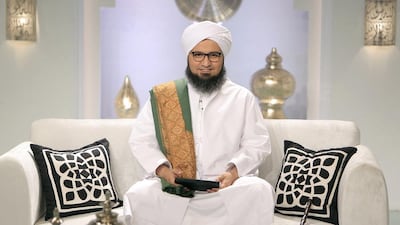ABU DHABI // A show airing during Ramadan has been addressing controversial or sensitive topics in a new light, aimed at helping young people avoid falling into the trap of extremism.
Humanity Before Religiosity highlights how humanity precedes religious practices in Islam. It features renowned Islamic scholar Al Habib Ali Al Jifri and has aired throughout the holy month on several Arabic channels.
Viewers are advised on how to deal with issues such as sexual identity disorders and relationships with non-Muslims in a humane manner inspired by Prophet Mohammed. The show has English subtitles and a sign-language interpreter.
Mohammed Alsaqaf, the show’s content strategist, said the issue of sexual identity disorder had not been previously addressed in a balanced, tolerant religious manner.
“Recently, before Ramadan, there were shows on some Arabic channels that denounced it in an offensive way and they got into inappropriate details,” Mr Alsaqaf said.
In his show, Mr Al Jifri clarified different aspects of the issue, distinguishing between biological and psychological drives for people with this disorder. He said they should not be hated or ridiculed, but treated and cured.
The topics were chosen based on the results of an online survey carried out by the Tabah Foundation, an Abu Dhabi think tank headed by Al Jifri that aims to encourage discussion and teaching of moderate Islam.
Young people were asked what they wanted the show to focus on and most chose topics related to morality or ethics.
“If a person is deficient in his humanity, when he becomes religious, this deficiency and heartlessness will affect his religiosity. They act in an offensive manner or don’t give people their rights,” he said.
“That is why we see religious people who pray, fast … yet it is easy for them to kill an innocent human being, or for them to accept the idea.”
Mr Al Jifri said humanity is “the vessel of a person’s religiosity” and cited an incident in which the Prophet Mohammed was asked by a Bedouin man about the essence of Islam. The Prophet listed moral values and acts of humanity before religious obligations and acts of worship.
While the show conveys that religion is above everything, it makes a clear distinction between a person’s religious beliefs and his or her religiosity, meaning the translation of those beliefs into actions and manners.
“The show’s goal was to clarify what religiosity means for a Muslim because there has been a mix-up, especially for millennials,” Mr Alsaqaf said.
“Religion is beautiful, but you see the religious person practising the opposite of this beautiful religion.”
Because some youth do not know enough about religion or Arabic, extremists attract young people by manipulating their understanding of certain verses and daily practices, to make them think they are right and everybody else is wrong, Mr Al Jifri said.
“So the topics were chosen based on common [inhumane] behaviour that a person could fall into,” he said.
While the show’s ideas were celebrated on social media by a wide audience, some criticised the title.
“Without getting into details, they considered the title a sort of dilution to the importance of religion, and [of a] secular approach to separate religion from religiosity,” said Mr Alsaqaf, explaining the criticism.
“They argued that one cannot have a religion if he were not religious.”
Douha Al Rifai, 45, a regular viewer and supporter of the show, posting on Twitter, said she liked how it highlights the idea that differences should not be a reason for hate. “Most ideas revolve around respecting the other,” said the law and sharia studies graduate.
Ms Al Rifai said it is important to stress that humanity should come before religiosity, to avoid falling into an overly strict and rigid embrace of religion that could lead to extremism.
The concept that humanity should come first highlights the authentic notions of mercifulness and tolerance in Islam, she said.
hdajani@Thenational.ae


